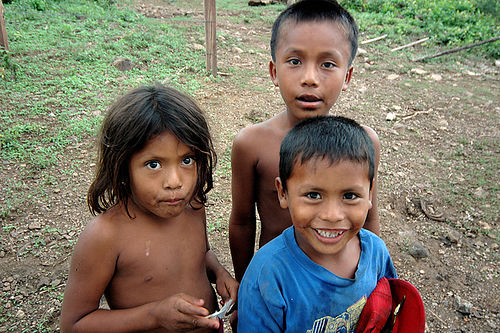It hasn't been easy to try and stop child labor in Nicaragua, and the following videos provide a look into the reasons why many children are still working despite the new laws. While some families are seeing value in getting their children educated and are responding to awareness campaigns, for others child labor is the way they keep their families afloat. While the law establishes that government, employers, syndicates and families all have the obligation to prevent child labor that could harm a child physically or emotionally and which keeps them from studying or developing, the hard economical situation in Nicaragua makes it very hard for families to resist either sending their children out to work or assigning domestic work for them to do at home.
Journeyman pictures cover this in Hard Labour, where it shows children doing dangerous work, while authorities either deny their existence or declare themselves unable to turn a child away when they know the income is needed by their families:
A group of children smash stones into small pieces, risking blindness as chips of rock fly into the air. Officially, child labour is illegal in Nicaragua and the cooperative leader in one quarry is quick to deny that any children are working there. “It is prohibited for children to work as stone cutters. It's much too risky. Children should go to school, not work.” But Anibal, a ten-year-old labourer, tells a different story. He has already spent a year in hospital after he was injured working at the quarry. “A pile of dirt fell from up high. It fell on me and injured my leg.” Despite the objections of the Sandinista government, being one of the poorest countries in Latin America leaves families with little choice. Diana Espinoza, the local representative from Save the Children admits it is a very difficult situation: “there's a whole market with child labour at several levels”.
However, some changes have been made, particularly in the coffee industry. Farmers who wish for their coffee to be part of Fair Trade, need to guarantee the children in the farms are not picking coffee but instead going to school. The coffee-pickers were child laborers themselves, and while they are aware of the challenges for them to send their kids to school instead of having them adding income, one of the woman also mentions that it is a sacrifice that needs to be made in order to successfully raise her children. However, getting a child back into school is not easy, as shown by the story of Fabiola and her son Jose, where even though she has wanted to enroll her child in school instead of having him working in the streets, she has faced obstacles all along the way, and even if Jose enrolls, he'll probably have to deal with the stigma of being a child worker.
Children pitch in with their opinions on child labor in Nicaragua in the next two videos. Through video training by Xchange Perspectives, children in the Jinotega region of Nicaragua reported on the issue:
And from Abre Tus Ojos Nicaragua [es], teens also reported on the issue in Matagalpa, to the North of Nicaragua. Through interviews with child workers as well as authorities in organizations trying to prevent child labor, the reasons behind these kids working are much of the same. For example, sometimes their family group is only the child and the mother, so the extra income is needed to make ends meet, or through sickness, these children become the only ones able to bring in income to feed their family and have to become adults overnight. Other times, parents have their children working so they learn about working and not lazying about doing nothing. Although they work all day and go home very tired, these children and teens take pride in the help they give their families, not considering it as “work” or something that denies them their rights. Actions being taken are combining education in the morning and then allowing for the children to go and help their families while raising awareness among the children and teens so they are aware of their rights.








2 comments